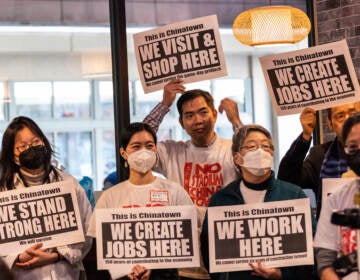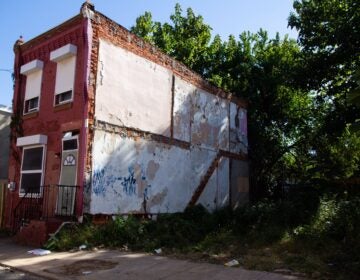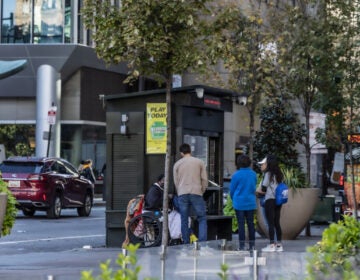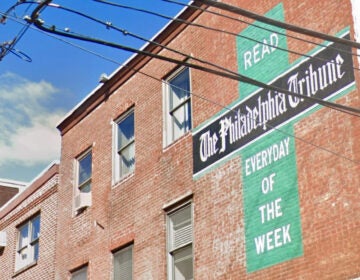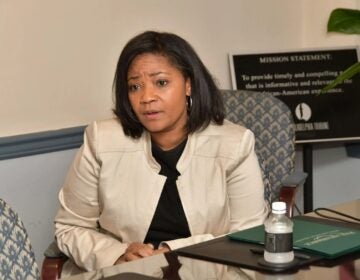Philadelphia hosts area faith leaders to explore reparations
The various congregations will work to create action plans that will become concrete blueprints for each group to make reparations a reality.

(From left) Donald Camp, Aziz Nathoo, Rabbi Linda Holtzman, Lucy Duncan, and the Rev. Naomi Washington Leapheart take part in the Truth Telling Project on Monday at Rodeph Shalom, at 615 N. Broad St. (Abdul R. Sulayman/Tribune Photo)
This story originally appeared in The Philadelphia Tribune
The Mayor’s Commission on Faith-Based and Interfaith Affairs, in partnership with The Truth Telling Project, has kicked off a four-day intensive course for Philadelphia’s faith leaders aimed at taking concrete steps towards making reparations a reality.
The course, which is a part of the commission’s ongoing “Rise up or Reparations” campaign, will have Philadelphia area faith leaders and congregants participate in intensive workshops focused on educating participants “about the multiple dimensions of reparations and how they can invite their congregation (for white majority congregations — toward offering repair; for Black majority congregations — toward making repair demands) deeply into this work in a multi-faith movement for reparations in this city,” according to a news release.
Over the course of the week, the course will examine “the historical, spiritual, conceptual (ethical and moral) and practical dimensions of reparations as a global movement” while being guided by a vision that involves “deep truth-telling, repair, and wealth redistribution with the faith community moving toward this work as a moral imperative.”
The Rev. Naomi Washington-Leapheart, director of Faith-based and Interfaith Affairs for the city of Philadelphia, said the symposium will fulfill a few objectives.
“I would say that we got two sort of big hopes. One is that the people who are gathered (for the course) will form a kind of cohort. People who previously didn’t know each other, people who are part of different faith traditions, different congregations, people who have different racial heritages and backgrounds will see themselves as a community after this week; a community of folk who are interested in material and spiritual repair,” Washington-Leaphart said. “So we want to build community this week as much as we want to raise consciousness and do a little teaching. We want these people to see themselves as members of the same team who are going to work together beyond this week.
“Then the second big goal is that everybody walks away on Thursday with the seeds of an action plan. We are going to spend some significant time on our last day sort of forcing the issue of practical implementation. We’re going to have congregations sketch out a plan that they want to implement in the next 12 to 18 months in their congregation. So more than, ‘Oh, I learned a lot,’ more than ‘I met some interesting people,’ we want members of congregations to return with a plan that is ready to be funded by that congregation and executed by that congregation over time.”
The first three days of the course, participants will hear from reparations scholars, activists and practitioners as they share “their experience and knowledge of reparations;” each of these sessions will also “explore seminal writings and experiences of the global reparations movement as well as offering embodied practices, engaging and integrating learnings, and exploring possibilities for action.”
The final day of the course will then focus on working with the various congregations to create action plans that will become concrete blueprints for each group to make reparations a reality.
“My hope is that participants leave here emboldened to continue to carry this torch even in the face of backlash of negative feedback. I mean, we’re trying to prepare them to go back into potentially hostile circumstances where people don’t agree and people will fight. We want them to be more courageous and stay the course. So my hope is that people stay the course and this is not just another one off experience that people can sort of tweet about, but it’s something that folks will actually implement as a lifestyle,” Washington-Leapheart said.
“Reparations we believe are a lifestyle and we want people to live reparations. We also hope that there will be resources pooled together like the congregations will raise money that will be poured back into Black communities as reparations. We hope that congregations will figure out how they might use their building in a reparative way, things like that. So we hope that there will also be some material investment made by these congregations to pay the moral and material debt that white supremacy has created,” Washington-Leapheart said.
WHYY is your source for fact-based, in-depth journalism and information. As a nonprofit organization, we rely on financial support from readers like you. Please give today.


